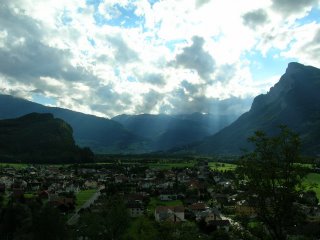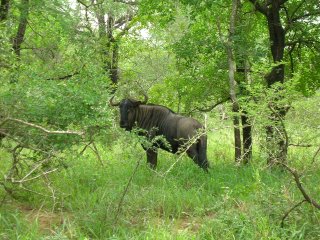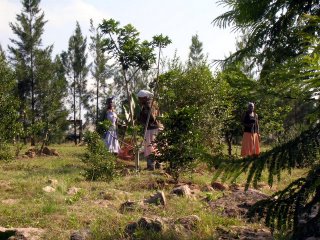An unbelievable criminal case has (almost) come to an end in Austria
Austrian girl 'found' after years
Police found stairs leading to a dungeon in the house
More details have emerged in Austria suggesting that a woman found near Vienna on Wednesday is a schoolgirl who vanished eight years ago.
The passport of Natascha Kampusch was found at the house where she was allegedly imprisoned and the woman had the same distinctive scar as the girl.
DNA test results are due later on Thursday which Austrian police expect will confirm the woman's identity.
The suspected kidnapper died after throwing himself in front of a train.
The man, named in Austrian media as Wolfgang Priklopil, had been chased by police earlier on Wednesday evening and his red BMW car was later found abandoned.
The schoolgirl's disappearance at the age of 10 had sparked a huge manhunt eight years ago.
The woman says she is Natascha Kampusch and relatives of the missing girl say they are confident she is telling the truth.
The woman - said to be in good health - says she was abducted and held captive in a sealed garage at the house in Strasshof, in the Gaenserndorf area on Vienna's northeastern outskirts.
Police were called when she was found staggering in a garden nearby.
It is not clear what the kidnapper's motives were. Police say he had no connection to the girl's family and there had been no ransom demand.
A police investigator told the BBC's PM programme that "he gave her food, he gave her all the supplies she needed".
"He gave her books, even taught her how to read and how to write, and mathematics and all things like this, according to what she told us."
Police have searched the garage, and say it looked like a dungeon.
Austrian media report that the room had a cavity measuring four by three metres (yards), with an entrance measuring 50cm by 50cm. They believe it was blocked with a sound-proof safe whenever the kidnapper left the scene.
A bed and bookshelf with children's books were reportedly also found there.
"She is white-pale, looking as if she had been out of the light of day for a long time, but she articulated well and could read and write," the Austria Press Agency quoted a police investigator as saying.
'Stockholm Syndrome'
APA also reported that she burst into tears on Wednesday night when she met the man believed to be her father, Ludwig Koch, at the police station.
Ms Kampusch's disappearance in 1998 shocked Austria and triggered a search that extended into Hungary and included the dredging of riverbeds.
The young woman says she was held captive for eight years
According to police, before committing suicide Wolfgang Priklopil had called a friend for help on Wednesday, saying he was being pursued by police for drink-driving.
Psychologists quoted by Austrian media say they believe the woman suffered from "Stockholm Syndrome" - a psychological condition in which captives begin to sympathise with their kidnappers.
Priklopil had been questioned by police in April 1998, as one of more than 1,000 owners of white vans. He was later released. A schoolfriend of Ms Kampusch had told police the girl had been abducted in a white van.
Police are investigating whether the woman had been beaten or sexually abused by the kidnapper.
What now for Natascha?
WHO, WHAT, WHY?
The Magazine answers...
Inside the cellar
What do psychologists make of the extraordinary case of Natascha Kampusch, abducted at 10, deprived of her childhood, and now back in the real world after eight years?
In March 1998, Natascha Kampusch was snatched from a Vienna street as she walked to school.
For eight long years, she was held in a cellar she believed to be rigged with explosives. Her only human contact was with her abductor, Wolfgang Priklopil, who effectively brought her up. He provided her with clothes, food, helped her with her studies. It is not yet clear if he sexually abused her.
But on Wednesday, Natascha escaped. An elderly neighbour of the man she had to call "master" found the 18-year-old, pale and in distress, and called the police. Natascha was soon reunited with her parents.
"Her life has been suspended, and it will take a lot to reconnect," says Dr Anuradha Sayal-Bennett. "She's obviously a very brave young woman, very resourceful, to have managed to escape."
WHO, WHAT, WHY?
A regular feature in the BBC News Magazine - aiming to answer some of the questions behind the headlines
Cellar girl 'our daughter'
That can only stand her in good stead for the long and difficult task of coming to terms with what she's been through. Natascha's is such a rare case that while she has undoubtedly suffered enormous trauma, there is no way of saying in advance what the precise effects will be - or how best to treat her.
Phillip Hodson, a Fellow of the British Association for Counselling and Psychotherapy, says those treating Natascha will be guided by her, asking her if she wants to talk about her experiences, and monitoring her for depression and flashbacks, for which there are a range of therapies.
"Go in with no assumptions, establish a basic rapport. Establish how used she is to conversation. Always put it as questions - 'they think you should talk about it; what do you think?'" he says.
Arrested development
It will be important to re-establish as normal a life with her loved ones as possible. But the life of a 10-year-old, or of an 18-year-old? For her first words to her father - after "I love you" - was "Is my toy car still there?" It had been her favourite plaything.
Dr Jack Boyle, a Glasgow psychologist who specialises in treating abused children, says a bit of both. "She has moved on emotionally from being a 10-year-old, yet that was the life she had that was abruptly cut off."
STOCKHOLM SYNDROME
Psychological response in hostages, in which they come to identify with their captor
Named after 1973 robbery in Stockholm, where bank employees sympathised with their captors
Famous case is heiress Patty Hearst (above), who helped her captors rob a bank
Another difficulty will be the feeling of abandonment, that no-one came to rescue her. A 10-year-old believes that adults are to be trusted, that her parents will be there for her, and these expectations have been shattered, says Mr Hodson.
"At the time of the kidnap, she will have been saying 'why don't my parents come and get me?' Then she'll have despaired of that happening, and thought 'bugger them'. That will be a considerable barrier to reunited with her family."
Then there's Stockholm syndrome, the coping mechanism whereby abductees exhibit loyalty to their kidnapper. Because Priklopil committed suicide after she escaped, this will further complicate Natascha's reactions.
"She'll have a lot of conflicting reactions - guilt and relief," says Dr Sayal-Bennett.
Phillip Hodson says his death will, in a way, be like losing a family member - even if she's glad he's dead.
"If somebody has been there through your transition from childhood to adulthood, it's impossible to not to form some sort of familial feeling. And she set in train the events that led to his death. That's a lot to come to terms with."
--------------------------------------------------------------------------------





 "We can't solve problems by using the same kind of thinking we used when we created them."
"We can't solve problems by using the same kind of thinking we used when we created them."







 Last night I went to the Cinema and watched the new movie by Pedro Almodovar " Volver".
Last night I went to the Cinema and watched the new movie by Pedro Almodovar " Volver".










